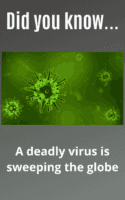Imagine waiting at the airport for your cousin who has just arrived from China. You haven’t seen her in a month. You are excited to see her and give her a big hug. Two weeks later you’re sweating, coughing and it feels like something is wrong but you shrug it off as the flu. It gets worse so you get it checked out and it turns out it’s not just any virus, but one that has killed hundreds of people to date. It is the coronavirus.
In mid-December of 2019, public health officials in China informed the World Health Organization (WHO) about a new virus causing pneumonia-like symptoms in the city of Wuhan. This mysterious virus, which is spreading at an alarming rate, has infected over 20 000 people in China with 425 confirmed deaths.
Where does it come from?
The coronavirus (also called the 2019-nCoV or Wuhan coronavirus), is usually common in animals and could in some cases infect humans. The virus causes respiratory infection and has shown evidence of spreading through human-to-human transmission. This means that you can get the virus by touching or breathing in contagious air (the air of the infected person, through coughing and sneezing).
When you are infected you might not know about it until two weeks later as the coronavirus has an incubation period (the time between getting the virus and getting your first symptoms) of one to 14 days.
Where has it spread?
There have been more than 185 cases of the virus reported outside mainland China, forcing the Chinese government to build two new hospitals on the outskirts of the city. These hospitals will be dedicated only to treating this virus.
The majority of cases reported outside of China have been detected in Thailand and Japan, both popular destinations for Chinese tourists. Most of these cases have a direct link to Wuhan but the virus is spreading to regions all over the world including Hong Kong, Australia, France, Germany, the United States and Canada just to name a few. There is some hope in Thailand as Thailand’s Ministry of Public Health said a Chinese woman showed improvement after she was treated with a cocktail of antivirals used to treat flu and HIV.
Closer to home, Kenya, Ethiopia and the Ivory Coast are the only African countries at this stage that have confirmed cases from passengers who flew in from Wuhan. All have reported that the tests were negative. Botswana has five suspected cases however, the Botswanan government has not confirmed this.
Across Asia, many countries have put in extra screening at airports and warned citizens to avoid travel to China. Countries like Mongolia, Indonesia and the Philippines have put in extra restrictions on Chinese tourists. While countries like Japan, are allowing authorities to force suspicious cases for hospitalisation and testing.
Is the coronavirus in South Africa?
Not yet. In a media briefing on the 31st of January in Johannesburg, it was confirmed that two South Africans had been quarantined in China following the outbreak. The National Institute of Communicable Diseases (NICD) says no cases of the deadly virus have been reported in South Africa.
The National Department of Health is urging travellers who are travelling to the city of Wuhan to avoid contact with animals and to use proper coughing etiquette (like putting a hand in front of your mouth when coughing) and proper hand washing hygiene to avoid coming in contact with the virus. Unfortunately, the WHO says wearing a mask does not guarantee protection from being infected.
No restrictions on travelling to China have been issued for South Africans, but those travelling from China and other Asian countries will be under surveillance, according to authorities. Health minister Zweli Mkhize confirmed that at least 35 South Africans are still in Wuhan.
Catching the coronavirus is very easy, which is why you’ll need to be careful if it does eventually reach South Africa. If it gets here, you’ll need to take extra precautions like washing your hands often and also keeping yourself informed. Informing yourself can go a long way to keeping you safe. For now, we are not directly affected but the fact is that the virus is moving closer and closer to our shores and ultimately, we do have a role to play in keeping ourselves safe.
Tell us: What are your thoughts about the coronavirus?

